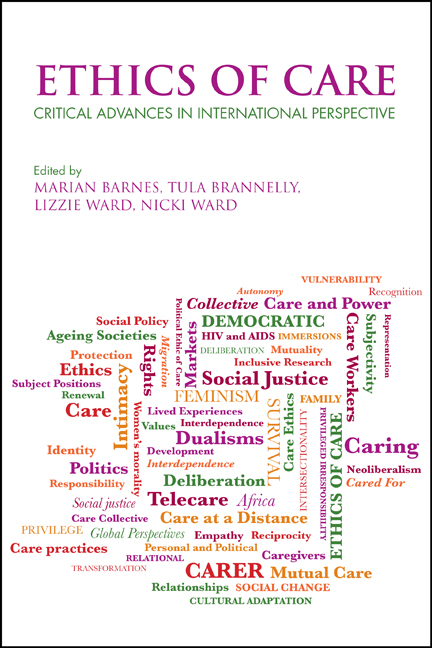Eleven - Contours of matriarchy in care for people living with AIDS
Published online by Cambridge University Press: 08 March 2022
Summary
Every distinct account of care brings with it a particular focus, and it is desirable to have many such accounts. (Tronto, 2013, p 20)
Introduction
The conventional attribution of the values of caring and nurturing to women results in the stereotypical image of women as ‘natural caregivers’ (Miers, 2002). Tronto (1993) refers to this framing of care as ‘women's morality’ and warns that it turns care into a ‘parochial concern of women’ instead of ‘a central concern of human life’ (Tronto, 1993, p 180). In the account of care presented in this chapter the focus is on care for people living with AIDS in parts of sub-Saharan Africa with a high prevalence of HIV and AIDS. Even though the impacts of AIDS manifest themselves in different ways, prolonged and erratic care needs are a common feature. Care is provided mainly in the home and largely by women. At first glance, this may be viewed as just another case of women's morality. However, in this chapter I shall present evidence indicating that women's care for people living with AIDS also empowers them. This could encroach on the patriarchal order, turning care into a societal concern rather than only a parochial concern of women.
Within sub-Saharan Africa, there are substantial differences in HIV prevalence between countries. In West Africa prevalence is lowest, in southern Africa highest. Throughout the entire region female HIV prevalence rates are twice those of men (UNFPA, 2011, pp 112–14). This chapter focuses on evidence from South Africa, Tanzania and Zimbabwe. In Tanzania, for example, from 2000 onwards, female AIDS deaths consistently outnumber male AIDS deaths (Tanzania Country Report, 2012, p 11). As Barnett (2006, p 345) observes: ‘In mature epidemics women are affected by HIV/AIDS more than men.’ He warns that ‘assumptions about the availability of women's labor and skills for household and farm work may not hold in the future’.
Barnett's warning also applies to women's availability as care givers. Overwhelmingly, women bear the brunt of the burden of caring for persons suffering from AIDS, and communities and governments depend on their doing so (Makina, 2009). In Africa, apart from the role of medical professionals in antiretroviral treatment or crisis mitigation, care for people living with AIDS (including palliative care) is provided mainly by women in the home.
- Type
- Chapter
- Information
- Ethics of CareCritical Advances in International Perspective, pp. 139 - 150Publisher: Bristol University PressPrint publication year: 2015



